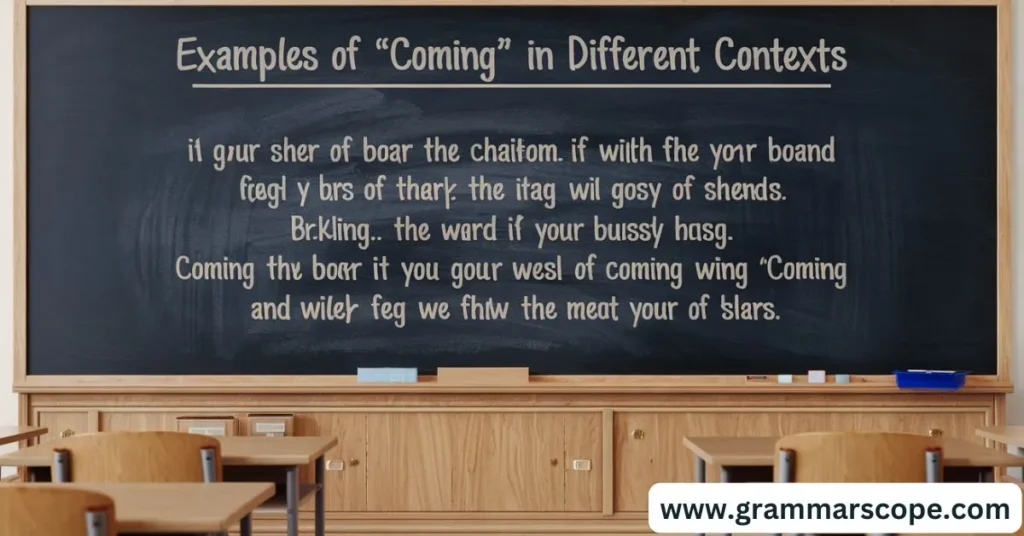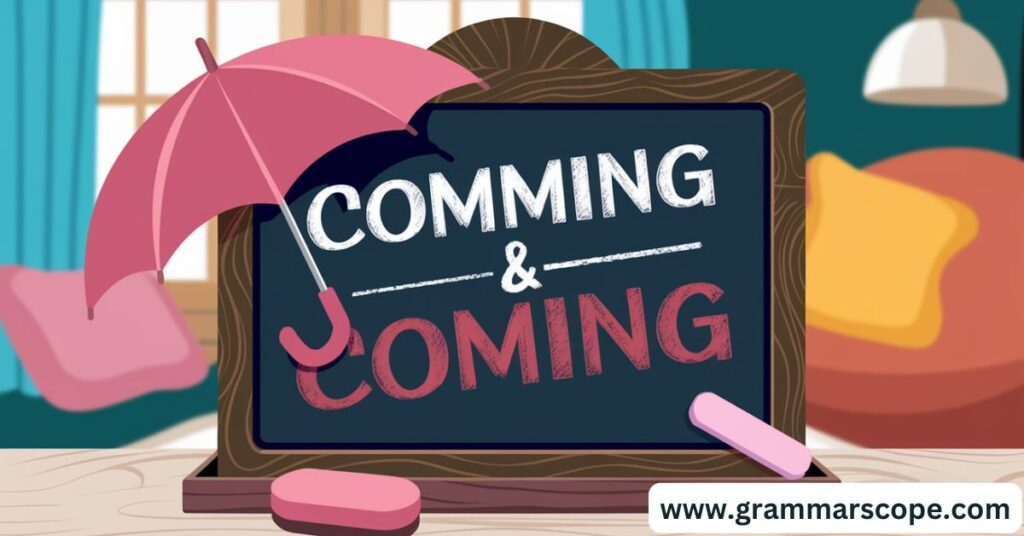English spelling can feel like a labyrinth, full of twists, turns, and traps. Among the most common pitfalls is the confusion between “comming” and “coming.” Although they look similar, only one is correct. Misusing these spellings can hinder your communication, especially in professional and academic contexts. Whether you’re writing a formal email, preparing a report, or crafting a blog post, understanding the nuances of “coming vs comming” is essential.
The secret to spelling success lies in mastering English spelling rules, particularly the silent “e” rule that dictates how words like “come” transform when paired with suffixes like “-ing.” Spelling errors such as “comming” don’t just distract readers; they can also harm your credibility, making your writing appear careless. But fear not! This guide will walk you through the key differences, common mistakes, and proven strategies for spelling success.
Through detailed explanations, scenario-based examples, and actionable tips, you’ll learn to avoid spelling traps and embrace proper spelling. By the end of this article, you’ll be armed with the tools you need to communicate clearly and confidently, whether you’re a student, professional, or avid writer.
Understanding the Difference: “Comming” vs. “Coming”

The distinction between “comming” vs. “coming” is straightforward: one is correct, and the other is not. “Coming” is the proper form, while “comming” is a misspelling. To understand why, we need to delve into the rules of English spelling.
When adding the suffix “-ing” to verbs ending in a silent “e”, the “e” is dropped to maintain a smooth, natural flow. Here are a few examples:
- Come → Coming
- Write → Writing
- Make → Making
In contrast, “comming” incorrectly doubles the “m.” This doubling rule applies only to verbs with a short vowel sound followed by a single consonant, such as:
- Run → Running
- Begin → Beginning
Because “come” ends with a silent e, doubling the consonant is unnecessary and incorrect.
Why “Comming” Is Incorrect
Misspelling “comming” instead of “coming” stems from a misunderstanding of spelling rules. Many English learners (and even native speakers) mistakenly double consonants in verbs like “come,” assuming it’s consistent with words like “running” or “stopping.” However, these patterns are governed by different rules.
The silent e rule ensures that verbs like “come” shed the “e” before adding “-ing.” Meanwhile, the doubling rule applies only to words where a short vowel is followed by a single consonant, as in “hop” or “run.”
Scenario Example: The Incorrect Use of “Comming”
Subject: Project Progress Update
Hi Emma,
I hope everything is on track with the new design. Is the final draft comming together, or are there any roadblocks I should know about?
Best regards,
Luke
In this example, the misspelled word “comming” could undermine the sender’s professionalism. The corrected version would read:
“Is the final draft coming together, or are there any roadblocks I should know about?”
The Correct Use: “Coming”
Now let’s focus on “coming,” the correct spelling. This form adheres to the silent e rule, ensuring clarity and correctness in your writing. Whether you’re describing an event, a transition, or progress, “coming” is the appropriate choice.
Scenario Example: The Correct Use of “Coming”
Subject: Event Planning Details
Hi Team,
The annual meeting is coming up quickly, and we need to finalize the venue and agenda. Let me know if you have any updates on your assignments.
Thanks,
Jessica
Here, the correct use of “coming” conveys professionalism and accuracy, leaving a positive impression on the reader.
Why Do We Make This Mistake?

The error of spelling “comming” instead of “coming” often occurs because English has inconsistent rules for adding suffixes. While some verbs require doubling consonants, others drop silent letters. Without clear understanding, writers may default to patterns they’ve seen in other words, like “running” or “stopping.”
Another factor is the lack of awareness about the silent e rule. Because silent letters are, well, silent, they’re easy to overlook during casual writing. This makes it all the more important to study and practice these rules.
The Silent “E” Rule
The silent e rule is a cornerstone of English spelling. It dictates that when a verb ends in a silent “e,” you drop the “e” before adding suffixes like “-ing” or “-ed.” Here’s a quick breakdown:
| Verb | With “-ing” | With “-ed” |
|---|---|---|
| Come | Coming | Came |
| Write | Writing | Wrote |
| Make | Making | Made |
By contrast, verbs like “hop” or “run” require doubling the final consonant when adding “-ing” because they follow a different rule.
Common Spelling Errors and How to Avoid Them
Misspellings like “comming” are part of a broader pattern of common spelling errors. Fortunately, these mistakes can be avoided with a few simple strategies:
- Learn the Rules: Familiarize yourself with the silent e rule and the consonant-doubling rule.
- Practice Frequently: Write sentences using tricky words like “coming” to reinforce proper spelling.
- Use Writing Tools: Apps like Grammarly or ProWritingAid can instantly flag misspelled words.
- Proofread Carefully: Read your work aloud to catch errors that might slip through unnoticed.
How Writing Tools Can Help
Modern writing tools are invaluable for catching and correcting spelling mistakes. Platforms like Grammarly and ProWritingAid offer real-time feedback, highlighting errors like “comming” and suggesting the correct spelling.
Here’s how they can help:
- Grammarly: Detects spelling, grammar, and punctuation errors. It also offers style suggestions to improve clarity and readability.
- ProWritingAid: Provides in-depth analysis of writing structure, clarity, and flow, in addition to spelling and grammar checks.
These tools act as a safety net, ensuring that your writing is polished and professional.
Examples of “Coming” in Different Contexts

In a Business Email
Subject: Quarterly Report
Dear Team,
The deadline for submitting the quarterly report is coming up next Friday. Please ensure your sections are complete by Wednesday for review.
Best,
Michael
In a Motivational Speech
“As we look ahead, I see exciting opportunities coming our way. Together, we can achieve remarkable things.”
In Casual Writing
“I can’t wait for the weekend. It’s finally coming after such a long week!”
Pro Tips: Avoiding the “Comming” Trap
To ensure you never confuse “coming” vs “comming,” follow these pro tips:
- Memorize the Silent E Rule: Practice with words like “coming” and “baking” until the pattern feels natural.
- Leverage Writing Tools: Use tools like Grammarly for real-time corrections.
- Proofread Strategically: Read your work out loud to spot errors that might escape visual checks.
- Practice with Scenarios: Create sample sentences using “coming” in various contexts, such as emails, essays, and dialogues.
Why Spelling Errors Matter in Professional Settings
Spelling errors like “comming” can detract from your message, particularly in professional communication. A well-written email or report not only conveys your ideas but also reflects your attention to detail and competence. Conversely, frequent errors can undermine your credibility, leaving a negative impression.
The Importance of Learning Proper Spelling
Mastering English spelling isn’t just about avoiding errors; it’s about expressing yourself with clarity and precision. Understanding rules like the silent e rule ensures that your writing flows naturally, helping you connect with readers effectively.
Frequently Asked Question
What is the correct spelling coming or comming?
The correct spelling is “coming.” “Comming” is incorrect and does not follow standard English spelling rules.
How to master English spelling?
To master English spelling, learn key rules (like the silent “e”), practice regularly, read widely, use writing tools, and proofread often.
What is the meaning of Comming?
The term “comming” is a common misspelling of “coming” and does not have a valid meaning in English. The correct word, “coming,” refers to the act of approaching, arriving, or happening soon.
How do you spell “coming” in a sentence?
You spell it as “coming” in a sentence. For example: “She is coming to the meeting later this afternoon.”
Wrapping It Up
In the debate over “comming vs. coming,” the latter is always correct. By understanding and applying spelling rules, you can avoid common pitfalls and elevate your writing. Whether you’re drafting a business email, crafting a motivational speech, or jotting down notes, proper spelling ensures your ideas shine through.
Use tools, proofread diligently, and practice regularly to master English spelling. With time and effort, you’ll navigate the complexities of the language with confidence, leaving “comming” mistakes behind for good.

Emma Olivia is an experienced blogger and the creative mind behind Grammar Scope. With a passion for language and years of writing expertise, she crafts engaging, informative content that simplifies grammar and writing tips for readers worldwide. Emma’s dedication to clear communication and love for the written word shine through every article she publishes, making Grammar Scope a trusted resource for language enthusiasts and learners alike.







